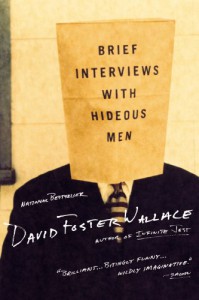Words, Words, Words
A catalog of my comments and thoughts on books, reading, and writing as well as anything I come across that seems interesting. I used to sell other people's words at an independent bookstore but now I hope to get by on selling my own.
Interactive Feedback Loops

I forgot, going into Brief Interviews with Hideous Men, about the experimental David Foster Wallace. After some time away from his work, I remembered the most distinctive parts - footnotes/endnotes, long recursive discussions about sincerity vs. appearance, elevated vocabulary - and forgot his abilities as a storyteller and the ways he played with voice and structure. Every feature we associate with Wallace and many that get forgotten are deployed in some story or another in Brief Interviews.
The story, "Datum Centurio," for example, is written as a dictionary entry (from the future). "Octet" starts as a collection of pop quiz/thought experiments that quickly breaks down into some confessional digression on the gulf between feeling and expression, what the writer wants to say and what the reader perceives. Adult World (II) appears to be authors notes for what a story yet to be written and, of course, the titular series of interviews with men who have IDEAS about sex and power and relationships and what those ideas reveal (the inquisitors contributions replaced simply with "Q.," a method he used in parts of Infinite Jest as well).
Experimentation can, of course, be Difficult, and the rewards are not easy. There is a lot of melancholy in Wallace's works and one need only read the list of titles including "The Depressed Person" and "Suicide as a Sort of Present" to understand that these stories will be plumbing some depths, but, if you can reckon with these subjects, you can find plenty of humor as well and solid storytelling, particularly (the storytelling) in the Interviews, I could not put the last one down.
Of the Wallace that I have read, the stories presented here are the most obsessed the viewer/performer hall of mirrors, the idea that the writer or character is trying to be honest and sincere and wants to get that across but can only do so by insisting that is what they are doing, which, of course, be seen as a narrative ploy and so the writer/character then sees how the reader is perceiving their attempt at sincerity as maybe not sincere and must try to convince the reader that really s/he is dropping all pretense, which can be perceived as etc. ad nauseam.
(This all adds an interesting fold to the ongoing debate about the conflation of the works of David Foster Wallace and who he was as a person, the constant stressing of sincerity and pieces such as "Octet" which discuss breaking that fourth wall and appealing directly to the reader. Is it that our culture that demands to know the man behind the art or that this man seemed to invite us to look beyond the art? That's all I will say on that.)
This, like all Wallace I've so far read, is a rewarding experience, but expect the difficulty both in thought and emotion that is a hallmark of his fiction. It can be work, but like exercise it is asking you to push beyond what feels good, to think harder and deeper so in daily life you will be up to the task. Brief Interviews does not rise to the height of Infinite Jest, a ridiculous mark to judge by in any case, but many of the same elements can be seen here making it good for those familiarizing themselves with his work or looking for more after reading his masterpiece. 4 Stars.
